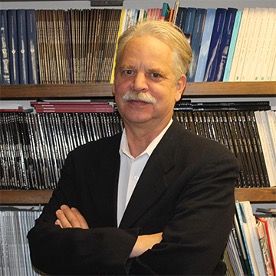Screening: "Errol Morris: A Lightning Sketch"
Wednesday, March 20th, 7:00-9:00 p.m., Franklin Hall 312
"Errol Morris: A Lightning Sketch" is a back-door documentary. Filmmakers Charles Musser and Carina Tautu travel to Fourth Floor Productions to interview Errol Morris in lieu of a personal appearance. They find Errol and his staff struggling with depression, in part from the senseless and unexpected death of film editor Karen Schmeer, who cut many of Morris’s films, and the harsh critical reception of his documentary "Standard Operating Procedure" (2008). The melancholic mood is sublimated by a whirlwind of activity, and when Errol expresses a desire to be filmed playing the cello, the filmmakers’ efforts take an unexpected twist.
Lecture: "Documentary's 'Longue Durée': Beginnings, Formations, Genealogies"
Thursday, March 21st, 5:30-7:00 p.m., Swain Hall West 007
We tend to think of cinema as a practice that began in 1895-96 and rapidly expanded. In this conception, documentary (Flaherty, Grierson, Vertov, etc) emerged about the time that the classical cinema (or more specifically the vertically integrated Classical Hollywood studio system) was falling into place—in the early 1920s. Yet we might think of cinema’s modes—particularly those of fiction and nonfiction (particularly that of documentary) as having two quite different histories or trajectories. In this regard, rather than look at the history of documentary film as narrowly defined by media-specific boundaries, we might examine the much longer history of the documentary tradition that involved a variety of media forms and significantly different practices that extend back to the mid 18th century, before the proliferation of modes of technological reproducibility.


 Charles Musser is a film historian and documentary film maker. He is a professor of Film and Media Studies as well as American Studies and Theater Studies at Yale University. His research has focused on such topics as Edwin S. Porter and early cinema, Oscar Micheaux and race cinema of the silent era, Paul Robeson and film performance as well as a variety of issues and individuals in documentary. His films include "An American Potter" (1976), "Before the Nickelodeon: The Early Cinema of Edwin S. Porter" (1982), and "Errol Morris: A Lightning Sketch" (2014). In 2014, he co-founded the New Haven Documentary Film Festival, which he co-directs with film director Gorman Bechard.
Charles Musser is a film historian and documentary film maker. He is a professor of Film and Media Studies as well as American Studies and Theater Studies at Yale University. His research has focused on such topics as Edwin S. Porter and early cinema, Oscar Micheaux and race cinema of the silent era, Paul Robeson and film performance as well as a variety of issues and individuals in documentary. His films include "An American Potter" (1976), "Before the Nickelodeon: The Early Cinema of Edwin S. Porter" (1982), and "Errol Morris: A Lightning Sketch" (2014). In 2014, he co-founded the New Haven Documentary Film Festival, which he co-directs with film director Gorman Bechard.